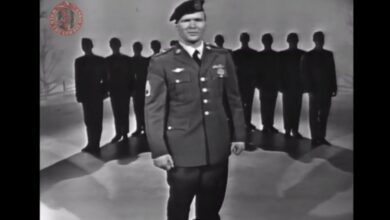Amazing Talent: Elvis Presley’s Grandson | Can’t Wait to See Him Perform Live!
Benjamin Keough’s rendition of “Folsom Prison Blues” on *The Voice* represented a pivotal moment for both him and the audience. As Elvis Presley’s grandson, he carries a unique legacy that is a mix of opportunity and challenge, intricately linking his story to that of one of music’s most legendary figures. This connection naturally attracts attention but also establishes high expectations for his artistic journey. During his blind audition, Keough moved beyond the influence of his grandfather’s fame, striving to establish his own identity within a venerable musical tradition.
At just 28 years old, Benjamin displayed remarkable vocal talent that surpassed his years. His interpretation of the classic Johnny Cash song highlighted not only his technical ability but also his deep understanding of the emotional weight of the lyrics. The way he combined elements of country, rock ‘n’ roll, and blues in his performance was particularly notable. It wasn’t just a simple cover; he breathed new life into a song rich with themes of struggle and redemption. His performance, characterized by a raw intensity, struck a chord with viewers, creating the genuine connection that is vital for any artist in performance.
The judges’ reactions underscored the impact of Benjamin’s audition in the competition. Kelly Clarkson, known for recognizing and nurturing musical talent, was visibly impressed. Her description of him as a “genius” highlighted the traces of Elvis’s vocal style in his singing while also recognizing his potential for artistic innovation. Such commendations from a seasoned artist like Clarkson not only affirm his abilities but also emphasize Keough’s unique position in today’s music landscape, balancing his inherited legacy with his aspirations as an individual artist.
Blake Shelton’s encouraging words further cemented the positive feedback Keough received. Shelton’s focus on authenticity revealed his belief in the sincerity and emotional depth of Keough’s musical approach—qualities that are essential in the country genre. Authenticity is often key to attracting listeners, and Keough’s performance resonated with both the judges and the audience. As he advances in the competition, Shelton’s acknowledgment could provide a significant boost to Keough’s confidence, inspiring him to take bold artistic risks beneficial for his growth.
Navigating the immense legacy of someone like Elvis Presley comes with its own set of challenges, yet Benjamin appears to embrace this as both a privilege and a responsibility. Rather than simply mimicking his grandfather or relying on inherited fame, he opts to explore the musical landscape in a way that is distinctly his own. His take on “Folsom Prison Blues” connected with many, but it was his unique interpretation that revealed his individuality while paying homage to his roots.
Keough’s charm is also crucial to his emerging career. While vocal skill is important, a magnetic stage presence can elevate a performance significantly. During his audition, his confidence and ability to engage the audience created an electrifying atmosphere. Standing ovations serve as powerful affirmations of audience approval, and his performance managed to capture the necessary energy for continued success on *The Voice*.
As he progresses in the competition, Benjamin Keough is bound to draw attention due to both his family lineage and his unique artistic choices. The success of his blind audition sets a high bar for his future performances, creating an expectation for him to continuously surprise and captivate his audience. His diverse influences—ranging from classic rock and roll to contemporary sounds—add an element of excitement to his journey. Each performance offers him the chance to either redefine or strengthen his artistic identity, making it fascinating to see how he will evolve.
The nuances of musical inheritance are complex, and Keough is well-positioned not only to celebrate a legacy but also to carve out his own path within it. His rendition of “Folsom Prison Blues” served as a platform for self-expression while honoring the timeless music that precedes him. Keough’s thoughtful approach blends tradition with modern creativity—an aspiration many artists pursue in today’s music industry—and this equilibrium may well be vital to his success.
Ultimately, Benjamin Keough’s appearance on *The Voice* exemplifies the enduring influence of music and the rich stories it conveys. The emotional depth of his performance, combined with the significance of his familial legacy, creates a compelling narrative that intrigues audiences. As he continues to take the stage, fans and critics alike will be eager to witness moments that reflect both his artistic growth and engagement with his profound musical heritage. The journey ahead holds exciting prospects for an artist striving to make his own mark while honoring the impactful legacy of those who came before him.





